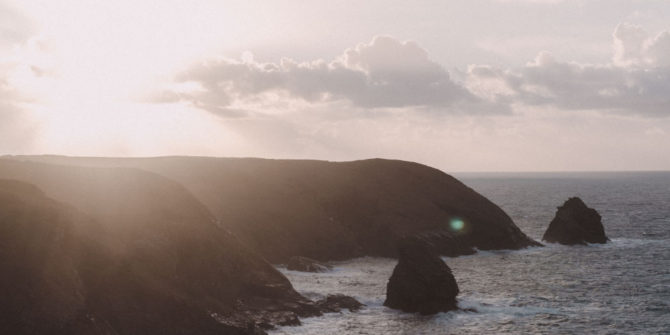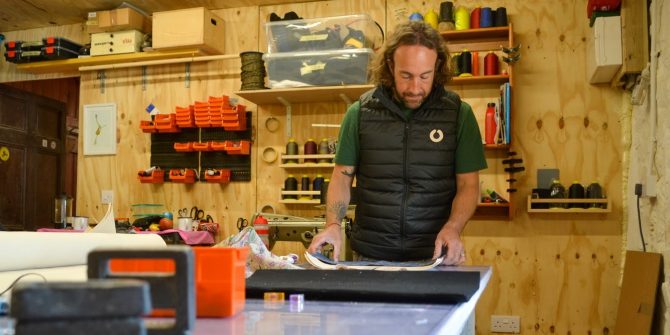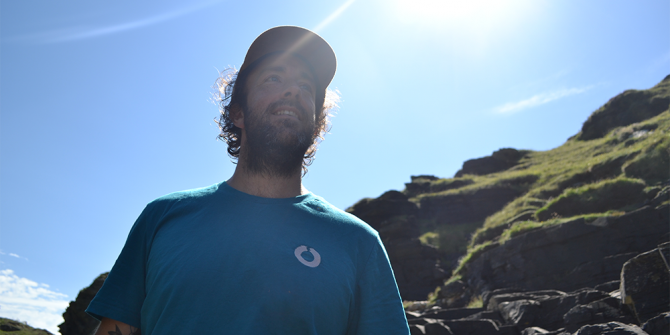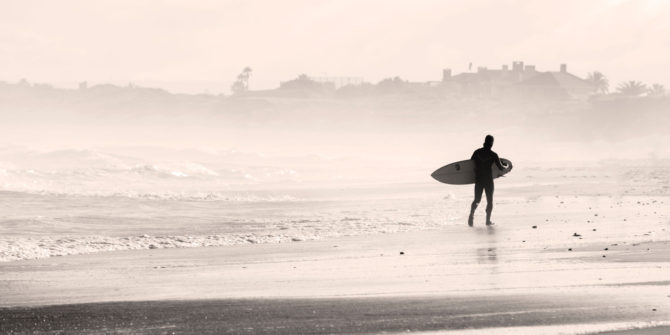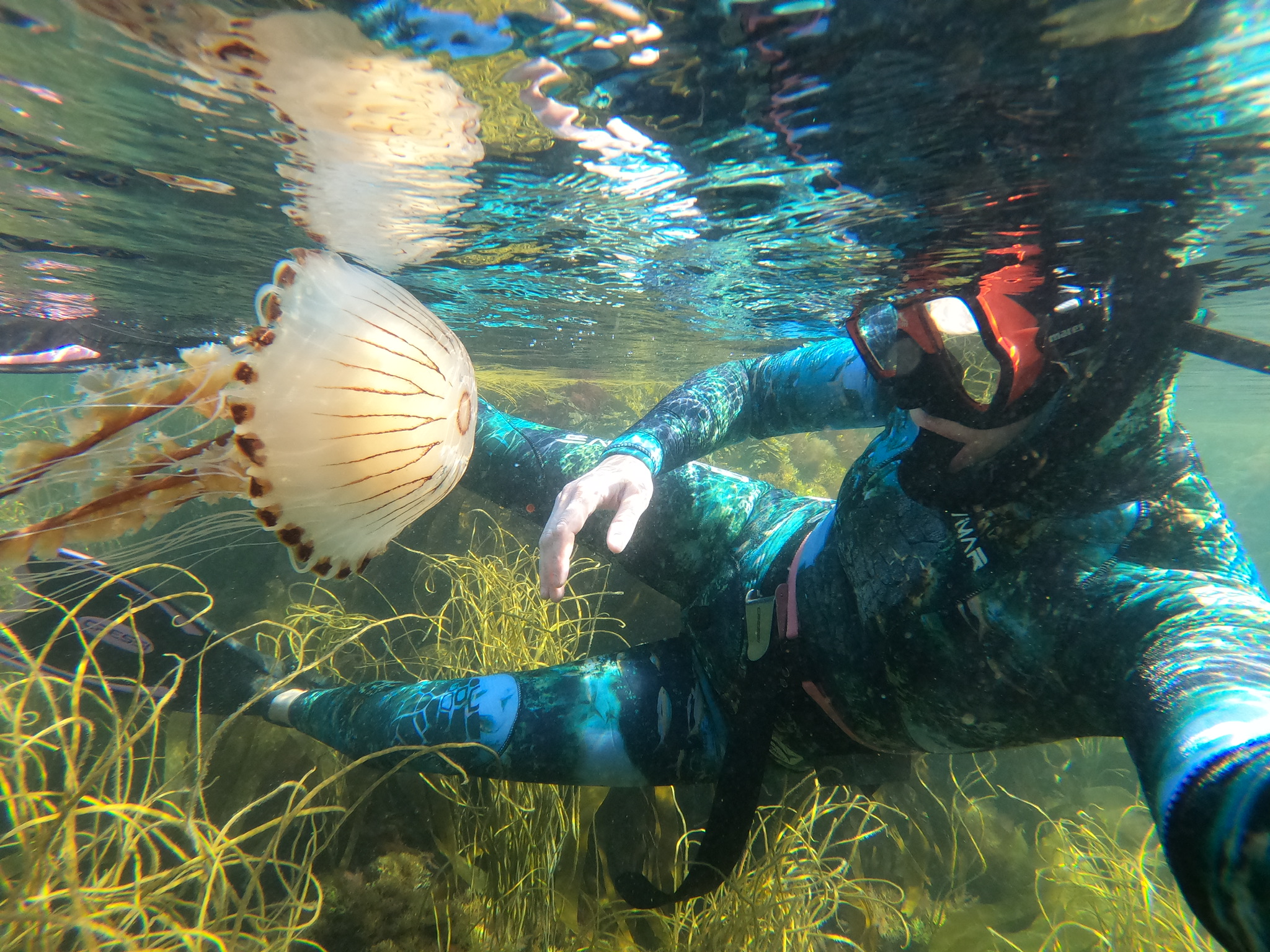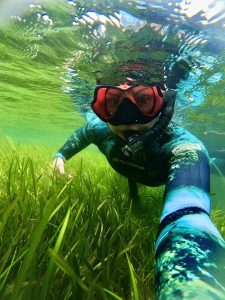Welcome to ‘A Sit and Yarn with…’; our new monthly Blog Series aiming to bring together a community of likeminded and soulful folk. This blog will be a chance for people to tell their stories and create inspiration for all you Rooted Ocean tribe. We hope that you will love reading the entries as much as we loved making them.
If you have something you would like to share with us all, drop us an email to book up a yarn!
To start us off, ‘A Sit and Yarn with… the wonderful Katie Maggs’
During a bitter, snowy mid-December day last year, we had the utter privilege of ‘diving in deep’ for a lengthy old natter with the wonderful Katie Maggs. Katie is a Penzance-based British Sub Aqua Club (BSAC) Snorkelling Instructor, advocate of outdoor sea swimming and snorkelling and she featured in the BAFTA nominated award-winning short film, ‘Tonic of the Sea’. Katie is also a marine mammal medic with the British Diver Marine Life Rescue (BDMLR) and committee member for the Mounts Bay Marine Group aiming to protect her local marine environment. In our yarn, she reflected candidly on her own personal journey and struggles that found her back in the water reminiscing on her childhood and passion as an excited young snorkeller with her dad.
Now, a rather busy snorkelling instructor, continuing to juggle all other life commitments as a Mum and a Penwith College lecturer in psychology and mental health, Katie discusses the importance of following your true passions in life, which ultimately led to her being dealt the hand of new beautiful friendships, opportunities, wellbeing, and wisdom (and for us to grab a set of fins and face masks and get stuck in).
In the words of Katie herself
“In the daily grind of life and what is expected of us in society, we have lost our way, but a connection with nature reminded me that there is something truly magical out there… Out there beyond ‘me’ and the daily ‘norms’ of my life.
I didn’t realise just how impactful sharing my love for snorkelling would be for other people! I started snorkelling for myself, but I could never have dreamt how much it would help everyone else. After I completed my Snorkelling Instructor course, it just went crazy. I was booked every day last summer, some days I would go in twice and I would be in the sea for 3 or 4 hours at a time, by the end of the day I was often wrinkled and freezing!!
Through the depths of winter, I hibernate a little as an instructor, and when I’m not taking anyone out, I can almost forget how much it helped people back in the summer. Of course, I still go in myself, and it continues to help me, but it’s lovely to be reminded just how much I’ve helped others too within my local community.
When I take people snorkelling in Cornwall their reactions are often emotional and incredible -I get a lot of shock and a lot of joy at how totally magical it looks under there. People say, ‘How is this in Cornwall – This is ridiculous!’. At points I couldn’t stop myself from smiling and laughing, because people would put their faces in and pop right back up saying ‘WOW’, ‘WHAT? THIS IS SO AMAZING!!!!’. It truly is like an underwater garden under there in the summer months when the conditions are calm and fair. I spent the summer watching complete happiness and joy wash over people’s faces. So many people booked for fun in their holidays with friends and family, some booked just to come and meet and snorkel with me which felt totally humbling and amazing! I also ran NHS Social Prescribing snorkelling sessions throughout the summer – so for a lot of people in need it really benefitted them”.
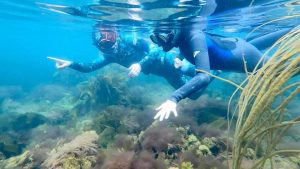 Photo Credit Elspeth Stevenson
Photo Credit Elspeth Stevenson
What is it about snorkelling that helps so many people do you think?
“When your face is in the water, you’re part of another world. On a still day it’s like you’re in an aquarium. All the outside noise disappears. Your perception of the world on dry land changes.
Low tide snorkelling is very safe and accessible. Any age can come along which makes it more appealing. You don’t have to be a good or experienced swimmer. I like to describe it to people that are nervous as a simple act of ‘just floating and looking’.
Because I could physically see how beneficial snorkelling was to so many people, I thought about how my snorkel experience trips could benefit the wider community, in a Social Prescribing capacity. I had struggled with mental health myself in the past and a connection with the sea was what had essentially saved me. Due to this I emailed the local GP surgeries to see if I could offer snorkelling for wellbeing.
My idea proved to be a success – people would sign up for all manner of things, stress, anxiety, physical ailments, chronic pain. I ended up taking women from Women’s Aid and Women’s Refuge who were obviously very nervous, and who had not been in the sea before. I felt so emotional, just to see the impact that snorkelling had on them. They came out saying they had never felt braver, more proud of themselves, they had found a new hobby, and they couldn’t believe the diversity of the marine life in Cornwall – comparing it to something they had seen on the TV in the tropics! Many found it soothing, an escape from all their troubles, a silent world that was easier than they had initially thought to access. I took regular sea swimmers too, those that loved swimming but were afraid of all the things that lay beneath them like long strands of kelp and thong weed. Once people could see the beauty of what it was that lay hiding below it completely eradicated their fear of the unknown.
I took people from all walks of life too; I had one fisherman who had spent his whole life on the sea but had never looked underneath it! He said that he hadn’t been too respectful of the sea or thought about the lives of the starfish and how they were living until going snorkelling. Surfers, divers, free-divers who were shocked at what you can see snorkelling had never thought of even going in at low tide. You would think that it wouldn’t appeal to a lot of people, but because it’s so accessible, it’s able to reach and impact so many more people than you would think”.
What sort of things are down there!?
I keep a journal of snorkelling throughout the seasons. The flora and fauna changes so much! You get such an array of amazing marine species. It’s not just the plants that change on land, it’s under the ocean too. The colours from spring to winter. The seaweeds, they change dramatically. Spring and summer are illuminous pinks, yellow candyfloss, blues and vivid greens. It almost looks fake. In autumn and winter, you get mauves, burgundies, and chestnut colours. The species change – there are lot more cuttlefish in the summer and different varieties of jellyfish that the changing currents bring in. I also saw a sea spider for the first-time last year. I didn’t even know they existed! I mean a swimming spider must be up there with one of the weirdest things I’ve seen in my life! I’ve also watched cuttlefish squirting ink and changing colour right in front of me! It’s just incredible to see!
You can also often get approached by seals, they’re like inquisitive puppies of the sea, but sadly they don’t realise that they are affecting their own feeding and rest cycles by trying to interact with humans. Where possible we should never attempt to interact or approach seals because we are interfering with their main job of hunting, feeding or resting. I did have an amazing encounter once with a 250kg male seal, who was longer than me! He swam right underneath me so at one point my chin was resting on his head! He was just looking at me with these huge beautiful big black eyes. I could feel his breath and whiskers brush on my hand while I held my Go Pro, it was a truly remarkable experience. You know they’re wild animals, they have very sharp teeth and are incredibly strong, an encounter like that with a wild animal definitely makes you feel very insignificant, humbled and small!
So, has snorkelling always been in your blood or is it a love you’ve developed over the years?
“My dad trained to snorkel in London and used to snorkel in the Thames! He did his indoor BSAC training when he was young and moved to Cornwall when he was 15. It was the first time he had seen the sea! My dad and grandparents moved into a little caravan on Hayle sand dunes and ended up running a fish and chip van called the ‘Friar Brigade’ because it was a converted fire engine!
We are three sisters: my twin and our elder sister. We grew up in Hayle and our dad used to take us to all the secret little coves that were way more secret than they are now. It was just him and us but he’d always disappear off in the sea adventuring! We were only young, and he would push us through underwater blowholes! We were half excited and half petrified! He would jump off the biggest cliffs all the time and come out of the sea with massive lobsters and spider crabs. We would be screaming but we loved it, he loved the outdoors and would always have us outdoors doing something!
My dad used to say you can’t feel any closer to nature than when you’re at the mercy of the sea. It encompasses you when you’re in it. It’s bigger than us. It’s in control. There’s also so much of it that’s unknown. Even in the shallows you see things and think ‘oh wow this is incredible!!’
Snorkelling really reminds us that we ARE nature. We are not separate from it.”
It wasn’t a direct path back to snorkelling for you was it… What was it that led you to taking it back up again in your late thirties?
“I grew up, came away from the sea, got a job, a mortgage, a family, had my son and 2 step children. I was very, very busy. I didn’t even realise that I was living in chaos, but it really was chaos. I was running on frantic mode all the time.
I remember thinking ‘something’s got to give!’… And something did give…. Which was me.
At 35 years old, I had a break down. I was poorly for about a year and signed off work. It was a real struggle. I didn’t come outdoors at all. I couldn’t go to work. I couldn’t see any way out of my ‘horrible disease’ that I now know was modern day burn-out.
It wasn’t until that time that outdoor swimming came back into my life. I’d go down to the local promenade in the morning to watch the sunrise. I liked to go out at dawn because I didn’t want to see anyone. I looked unrecognisable. I’d lost loads of weight. I didn’t want to speak to anyone but that’s when I came across a gentleman called Mike Conboy and the Battery Rock sunrise swimmers. They came across me one morning looking dishevelled and sad. I refused a few times when they asked if I wanted to go swimming. I’d sort of scuttle off! Then the next morning they would always ask again and kept trying.
They eventually became a little family to me, an extended family. Mike in particular, took me under his wing. The group helped me regain some form of safety, community and belonging and were pivotal in my recovery. I don’t think they realised that at the time, but they do now hopefully.
I was taken aback by the kindness of strangers. It was like having my own free support group. There’re outdoor swimming communities across the country now and so many people have found similar support through them which is so vital and amazing.
I also always feel it’s not just the swimming necessarily. Swimming’s great exercise and that’s positive for our mental health and wellbeing, but the bigger thing for me was cold water immersion, whether its swimming, snorkelling, surfing, whatever it is that you are doing!
I eventually started to move away from swimming because I realised that I had started to ‘swim swim’, you know, picking up my distance. We must be careful to remember why we start doing things to begin with and to reflect on the things that can make you poorly in the beginning, like being competitive, trying to be better, faster, stronger.
It started to happen to me. I started to get stronger, fitter, swimming further distances, doing a mile across the bay and back every morning. But then 6 months after restarting sea swimming, I began to experience similar burn-out symptoms in my body again. Anxieties around underperforming, beating myself up because I hadn’t swum as far as I ‘should have’. The ‘should haves’ didn’t suit me or who I was, and I began to pull back from swimming and remember all the things that Mike had taught me. He used to say, ‘let’s just lay on our backs and stare at the clouds’, ‘let’s look at the light through the seaweed with our goggles’… After all, the reason I started outdoor swimming in the first place was for the quiet, the connection and the stillness.
I eventually began to get bigger and bigger goggles. Before long I had the biggest goggles, I could find to totally maximise everything I could see! [laughing]! After some time, I found myself buying a snorkel mask and fins, asking my dad about what sort of fins he used when we were younger.
When everyone else was swimming on the top, I’d want to see what was underneath! I was so happy just looking at one jellyfish or a starfish for half an hour!
A few months later I decided to complete a snorkelling instructor course as I wanted to try to run it as a small part time business. I had taken family members and friends out with me and all of them had said how great it would be to be able to come to Cornwall and book low tide snorkelling experiences.
After my first successful summer of running snorkel trips, I’d wait for the snorkellers at the wall by Battery Rocks, where Mike used to wait for me for swimming when I was poorly. It was what really made snorkelling for me. I was now helping others in a similar way that someone else had previously really helped me”.
Has snorkelling completely replaced your sea-swimming now or is there still a little part of you that still wants to swim the miles?
“The one thing I love about outdoor swimming is that it means something different to everyone, and it always evolves and changes. I mean, I don’t swim outdoors anymore. It doesn’t mean that I won’t go back to it, but I snorkel in the sea all year round and I pool swim in the winter to keep my water fitness up, for health and for mine and others safety. I swam for 6 years in the sea nearly every day at dawn all year round just in a swimming costume but now my snorkelling has taken me on a different path and that’s ok too. I’m a firm believer that life is always changing and so it is important that we learn to go with the flow, change direction as and when we need to so that we constantly evolve. I recognise after my break down that I need to live in a way that suits my forever changing circumstances and needs. Its important for us all to not be defined by just one single thing. I think we can often feel like we’ve failed if you stop doing something that you’ve always done, or you suddenly change direction but in my experience that just us living and really growing well!
That said, every so often I do still feel like having a little sea dunk! Because I wear an open cell suit all year for my snorkelling, I miss the feeling of just having a costume on. It resets you… you can be in the worst mood ever and come out feeling like a totally different person! Sometimes I really crave it and just want to immerse my face and head, I do miss that element of it in the winter really, that cold type of reset – but I know that I can just walk to the sea front and get in when I want to and that come spring and summer again I won’t be out of the sea”.
As a committee member of the Mounts Bay Marine Group, do you think snorkelling has the power to help preserve our marine ecosystems?
“From a conservation perspective, I’m really passionate about the fact that if you can physically show people the ocean environment, they will learn to be empathic about it. When you see marine life in its natural environment scuttling along the ocean floor, you can’t help but think about its life cycle and its routine. It encourages people to learn more about it and to protect it. It’s the curiosity that fuels conservation.
We must keep working on it, keep educating people about our underwater world, and it’s the education through actually experiencing something which brings about important emotions that fuel actions like empathy, joy and curiosity. Showing people the underwater world first hand through snorkelling helps to light a spark in them, to want to learn something more and in time also want to protect and preserve it.”
What advice would you give to someone who hasn’t been ‘just floating and looking’ with a snorkel before?
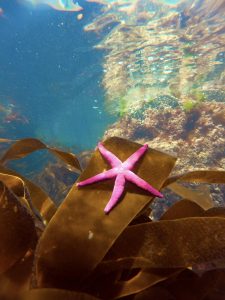
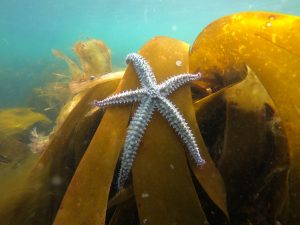
“I’m just a normal person who had an interest in something. No one has to be an expert. No one has to be a marine biologist. You just have to be curious about something a little bit.
I didn’t know anything before I started snorkelling! Well, I knew the difference between a starfish, a crab and a piece of seaweed, but after I’d go home, used Google, bought loads of books and just learnt it all by myself. Through passion only, and a couple of years of getting in there and wanting to know more, I became more and more knowledgeable about it all.
For my own wellbeing I try to never think ‘I should be out there doing this or that’. The reality is not quite like that. Do what you feel like doing, when you feel like doing it. It’s that simple.
If it’s not snorkelling that does it for you, I would say that it’s important to think back to what made you happy when you were little, but accept that you are always changing. This snorkelling stuff could change into something else next year and that’s okay for me. That’s the exciting bit – the not knowing. Just allowing it to grow, as it should, is exactly the right and most natural way to be.
All I know for now is that snorkelling makes me really happy and I love seeing it make other people happy and showing other people something beautiful, it all about sharing the magic of it. There’s something unbelievably special about that, about doing good in your local community, sharing something good with others to allow them to also experience that. It’s worth its weight in gold to me and takes me back to how my dad made my childhood feel – a never ending feeling of wonder, curiosity, and endless possibility.
Photo Credits Katie Maggs 🙂
You can check out an inspiring range of Katie’s latest videos, photos, articles and info, or book in for snorkel session with her via her website at www.tonicofthesea.co.uk or by emailing katie@tonicofthesea.
Give Katie a follow:
Instagram: tonicofthesea
Facebook: Tonic of the Sea




